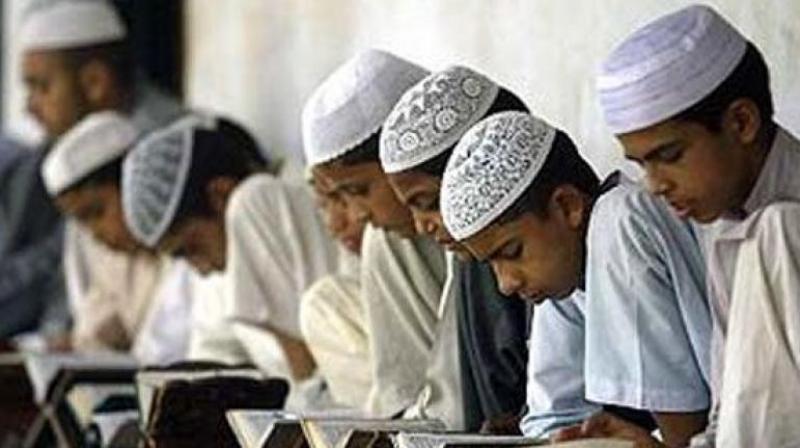Last Updated on November 5, 2024 2:05 pm by INDIAN AWAAZ
A bench comprising Chief Justice of India DY Chandracuhd, and Justices JB Pardiwala and Manoj Misra gave the verdict against the High Court’s March 22 judgement striking down the Madarsa Education Act 2004 as “unconstitutional”. but at the same time it invalidated invalidate ‘Fazil’ and ‘Kamil’ degrees for future…
Staff Reporter / NEW DELHI
In a major relief to Madarsa students and teachers in Uttar Pradesh, the Supreme Court today upheld the constitutional validity of the Madarsa Education Act 2004, cancelling the Allahabad High Court order that struck down the law on grounds that it violated the principles of secularism.
A bench comprising Chief Justice of India DY Chandrachud, and Justices JB Pardiwala and Manoj Misra gave the verdict against the High Court’s March 22 judgement striking down the Madarsa Education Act 2004 as “unconstitutional”.
“The Allahabad High Court erred in holding that the madarsa law had to be struck down for violating basic structure, which is the principle of secularism. The legislative scheme of the Uttar Pradesh Board of Madarsa Education Act was to standardise the level of education being prescribed in madrasas,” it added.

The Supreme Court further said that madarsas granting ‘fazil’ and ‘kamil’ degrees beyond class 12 cannot be recognised by the Uttar Pradesh Madarsa Board as these are in conflict with the UGC Act and to that extent it was unconstitutional.
“The Supreme Court has set aside the Allahabad High Court’s judgment wherein it was said that the existence of Madrassa Board and the Act which created it are against the principle of secularism and therefore unconstitutional. SC has said that these are not against secularism,” says advocate Anas Tanvir on Supreme Court upholding the constitutional validity of the 2004 Uttar Pradesh Board of Madrassa Education Law and setting aside an Allahabad High Court verdict quashing it on the ground that it was violative of the principle of secularism.
Top points of Verdict
- Madarsa Act regulates education in madrasas;
- It is consistent with positive obligation of State which leads to persons earning decent living;
- Article 21A (right to free and compulsory education) and Right to Education Act has to be read in way so that religious and linguistic minority institutes can impart education;
- It is within the legislative competence of State;
- Provisions of Madarsa Act on fazil and kamil dealing with higher education is in conflict with UGC Act and is thus set aside as unconstitutional.
Background and High Court judgment
The Bench had in May stayed the High Court’s decision to declare the Act unconstitutional. Madrasas/madarsas refer to institutions where Islamic studies and other education may be pursued by students.
The Uttar Pradesh Board of Madarsa Education Act, 2004 had defined Madarsa-education as including education in Arabic, Urdu, Persian, Islamic-studies, philosophy and other branches of learning as may be specified by the Uttar Pradesh Board of Madarsa Education.
The stated object of the 2004 Act was to empower the Madarsa Education Board by overseeing the functioning of madrasas.
The Act was challenged on the ground that it goes against the principle of secularism.
It was also argued that it fails to provide quality compulsory education up to the age of 14 years/Class-VIII, as is mandatorily required to be provided under Article 21A of the Constitution of India.
It was further contended that it fails to provide universal and quality school education to all the children studying in madarsas, as is mandatorily required to be provided under Article 21 of the Constitution of India.
Thus, it violates the fundamental rights of the students of the madrasas.
Senior Advocates Abhishek Manu Singhvi, P Chidambaram, Mukul Rohatgi, Menaka Guruswamy, PS Patwalia, MR Shamshad and Salman Khurshid appeared for the appellants before the apex court.
They were assisted by advocates Rohit Amit Sthalekar, Sankalp Narain, MA Ausaf, Hritudhwaj Pratap Sahi, HP Sahi, Srivats Narain, Ranjeeta Rohatgi, Yash Johri, and Lubna Naaz.
Senior Advocate Guru Krishnakumar appeared for the lawyer who had filed the petition challenging the Act before the High Court.
Senior Advocate Madhavi Divan represented a respondent.
Additional Solicitor General KM Nataraj appeared for the State of Uttar Pradesh.
Senior Advocate Swarupama Chaturvedi appeared for the National Commission for Protection of Child Rights.

